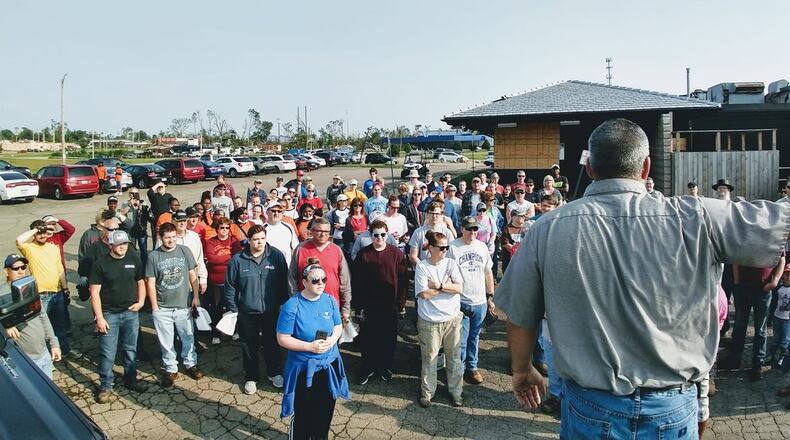MIAMI VALLEY TORNADOES: What you need to know
“If we can harness the power of a number of churches working with community efforts all together in unity, then we can make a much bigger impact and transformation,” Ingram said.
Initially churches helped with immediate relief, collecting and distributing donations and assigning volunteers.
“So much of that was just organic,” Ingram said. “Each church in their community, people got out and they knocked on doors and asked people if they needed help.”
In Beavercreek Twp., where up to 1,000 buildings were damaged, Be Hope Church was an outpost for volunteers and donated goods the day after the tornadoes hit, Pastor Alyssa Evans said.
RELATED: Community by community assessment of tornado damage
Some of Be Hope’s volunteers worked with a congregation member’s tree care service to remove fallen trees that blocked driveways or sidewalks around Beavercreek. Dayton Vineyard Church also rented three trucks and scheduled a volunteer cleanup day Saturday to remove what’s left of the debris around the community.
“This is something very practical, as a church, that we can make a difference,” Scott Sliver, assistant senior leader at Dayton Vineyard, said in a Facebook video.
In Trotwood, a small Missional community led by Rev. Chris Hall helped people move out of their damaged homes and put their belongings into storage units.
Hall, who is also on staff at Englewood’s Fairview Brethren in Christ Church, said a quick response poured in from people who wanted to help during the cleanup. But that attention will need to shift soon.
“This immediate need is one thing,” Hall said. “But we need to think about the next six months, the next year, too.”
Many families have left Trotwood after large apartment complexes were damaged in the storm, which has Hall worried that many also might leave the Trotwood-Madison City School District.
“As a city and a school system, the thinking is, ‘How do we help people get moved back into Trotwood?’” he said.
Churches might have to consider offering grants or micro-loans, Hall said, to encourage some displaced residents to return to Trotwood.
RELATED: Renters face months of waiting to find housing
Declare Dayton has the ability to help with people’s long term housing and financial needs by bringing churches together, Ingram said.
As Dayton moves into a new phase of recovery, Ingram said he’s also been encouraging churches to donate to secular organizations that might have a better understanding of who needs assistance and how to help them.
In Beavercreek, Be Hope Church collected and donated $10,000 to Miami Valley Community Action Partnership to rehouse Greene County residents displaced by the storm.
“We chose to partner with (MVCAP) because they do relief work 365 days a year,” Evans said. “They have a system in place, a process in place to do that.”
Apart from financial contributions, Ingram said the church can offer emotional support and guidance as well.
Declare Dayton also is looking at providing advocates for people who have been affected by the tornadoes. An advocate would be somebody who could regularly meet and communicate with affected individuals, monitor their needs or guide them through the process of recovery.
For Ingram, he said he hopes the response to the tornadoes will inspire more churches to take a more active role in treating the needs of their communities.
“I’m hoping and praying that we don’t need a tornado again to get the church to be this force of love and compassion and serving that I’ve seen that we can be,” he said.
About the Author
